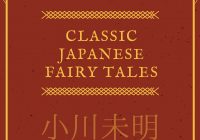Bilingual book of classic Japanese fairy tales released (Mimei Ogawa: The Father of Modern Japanese Fairy Tales)
After doing translations of Japanese fiction for over two years now, I’ve gradually moved from the stage of just putting translations on my blog informally to releasing them in E-book form on Amazon. My first two books were translations of a classic SF Japanese author (Juza Unno), and while that was a great experience, for… Read More »



